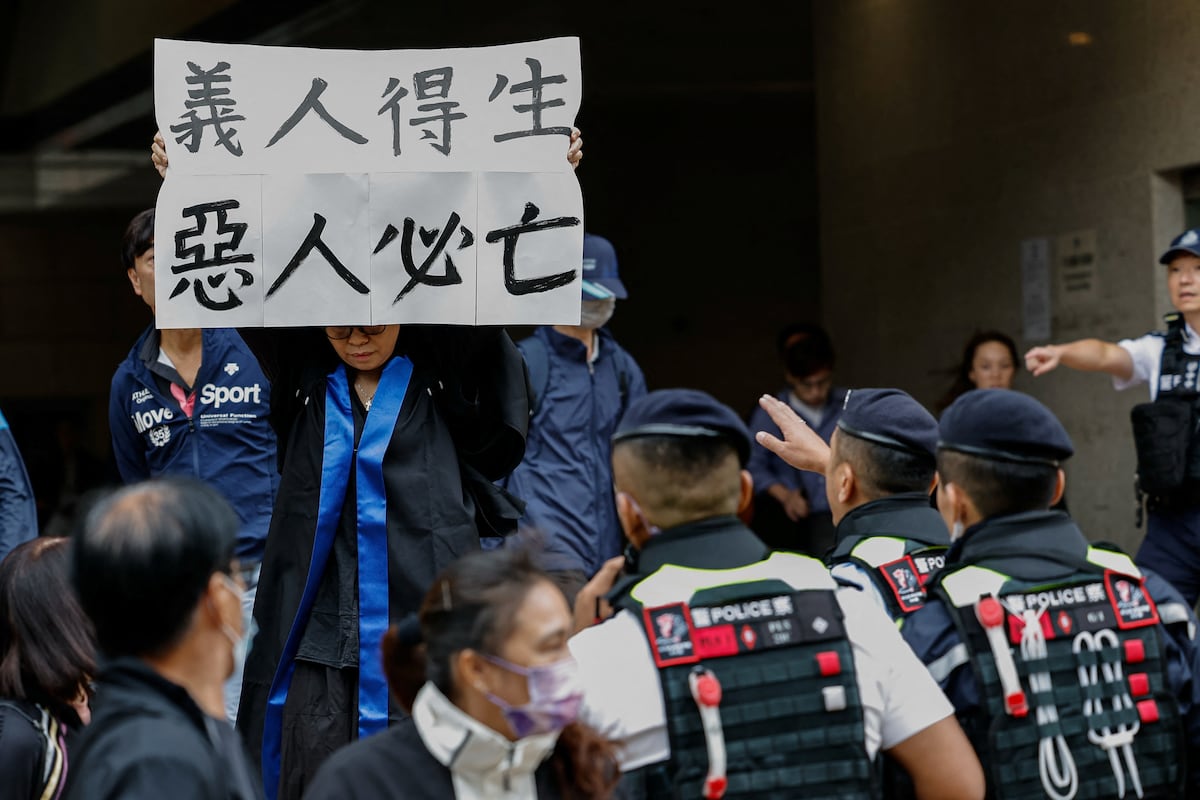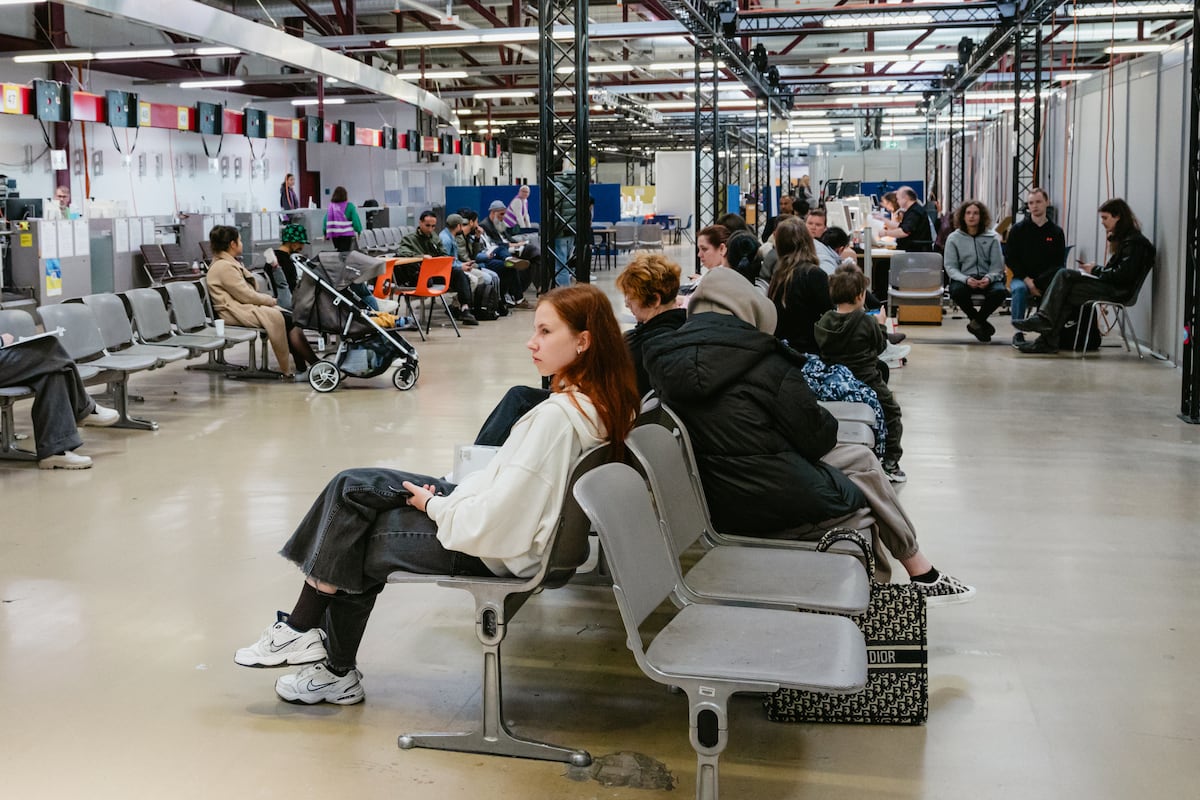This Tuesday, the Supreme Court of Hong Kong sentenced 45 opponents to sentences of between 4 and 10 years in what is the latest episode of a macro-process that will be remembered for marking the turning point between the end of an era and the beginning of another in the autonomous region of China. Those sentenced are a heterogeneous group of politicians, academics, journalists and activists detained in 2021 on suspicion of subversion under the provisions of the National Security Law approved by Beijing in 2020 to put an end to the pro-democratic revolts that shook the territory. Former jurist Benny Tai Yiu-ting, 60, promoter of the informal primary elections held in 2020, has received the highest sentence: 10 years in prison as the “main perpetrator” and “mastermind” of a plot whose intention was to conspire. to subvert the power of the State, according to the ruling.
The other 44 defendants, mostly candidates in those unofficial primary elections, have received sentences of between four years and two months and seven years and nine months in prison. In Tai’s case, the sentence was initially going to be 15 years, but it has been reduced by a third for pleading guilty in time. This former law professor at the University of Hong Kong, who was also among the ideologues of the mobilizations that gave rise to the so-called umbrella protest of 2014, “was not only the initiator of the plot, but also an organizer of the primary elections,” the magistrates argue in an 82-page ruling reported by the Hong Kong newspaper South China Morning Post.
Joshua Wong, 28, known internationally as the face of the student protests, and labeled an “extremist” and “secessionist” by Chinese state media, has received a sentence of four years and eight months.
“The wicked will die”
Dozens of people with umbrellas approached the judicial offices early this Tuesday, protected under a strong judicial device, to try to witness the hearing. Following the sentencing, Elsa, the adoptive mother of Hendrick Lui, one of the convicted, was detained by uniformed officers when she displayed a sign that read: “The righteous will live; the wicked will die,” as reported by the Hong Kong Democracy Council, an organization supporting the movement.
In the early hours of January 6, 2021, 55 opposition politicians and activists were arrested for their relationship with that unofficial election call, in which some 600,000 votes were cast (in a territory of 7.3 million inhabitants). The organizers sought to launch unified candidacies for the legislative elections that Hong Kong was to have held in September 2020, and which were postponed due to the coronavirus pandemic. The intention was to enter the Legislature with a unitary opposition formation, whose seats today are dominated by pro-Beijing parties.
Of the 55 detainees, 47 were charged shortly after, accused of being part of a “evil plan” to “paralyze” the Hong Kong Government and undermine China’s national security. The macro-trial finally began in February of this year, with 31 of the defendants pleading guilty to the acts of which they were accused; In May, two of those on trial were acquitted and 14 others were convicted. The final sentence, with the details of the sentences for the defendants, is what the judicial authorities issued this Tuesday, almost four years later.
“When social institutions crumbled one after another around us, we rose above fear and emerged as a true civil society, each living the true meaning of citizenship,” Gwyneth Ho, one of the condemned, has written in an extensive text published on Facebook after receiving the sentence to seven years in prison. “Although we were denied democracy at various institutional levels, we built it from the bottom up.”
An opposition laminated since 2020
The sentence is a serious blow to the democratic opposition in Hong Kong, almost completely weakened since Beijing promoted the tough National Security Law in 2020 to control the protests that shook the territory for months. Since then, the movement has been silenced between arrests, newspaper closures and the emigration of many of its protagonists and sympathizers.
The rule provides for life imprisonment for those who plan “terrorist”, “seditious” or “subversive” activities and its promulgation marked a turning point in the legal architecture of the international financial center since it ceased to be a British colony and China regained its sovereignty. in 1997. Critics say it curtails the freedoms that mainland China promised to guarantee until 2047 in the autonomous territory. In March, the Hong Kong Parliament complemented that architecture with the approval of its own National Security Law, denounced as a tool created to deal a terminal blow to any type of dissent. The communist authorities in Beijing consider that the territory is currently under control after a period of “chaos” that they are not willing to tolerate again.
“Running and trying to win an election is now a crime that can lead to a decade in prison in Hong Kong,” Maya Wang, associate director for China at Human Rights Watch, said immediately after hearing the sentence. . “The harsh sentences […] “They reflect how quickly Hong Kong’s civil liberties and judicial independence have plummeted over the past four years.”
This Wednesday, another paradigmatic case related to civil liberties in the autonomous territory is expected to resume, the trial against Jimmy Lai, founder of the defunct newspaper AppleDaily. Lai, 76 years old and detained continuously since December 2020, is also charged under the National Security Law, in his case for collusion with foreign countries or external elements.







